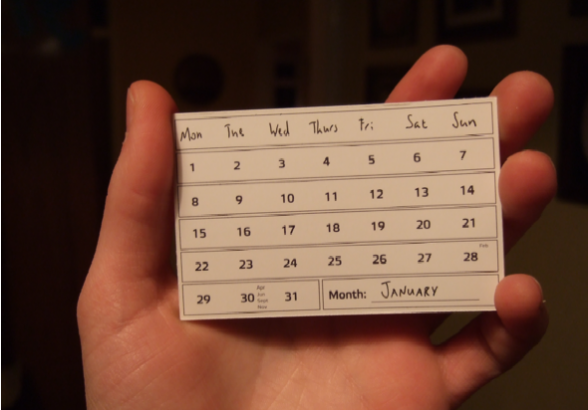 Photo Credit
Photo Credit
Written by monthly contributor, Natalie Didlake.
Oh, how I love to organize! How about you?
Whether you love it or dread it, we all have to do it. Which means we all have to decide what to organize, when to organize it, and what to let go. Which means we all need a grid for thinking about how and why to work towards order in our homes!
The Hyper-Organized Homemaker
Some of us are perpetual organizers. This would be me. These people swoon over label-makers, calendar apps, and laminators…all in hopes that we can pull our lives perfectly together. Then, we promise ourselves, we will begin the real stuff of living.
The Mellow Mommy
Others (not me) squeeze a little organizing and prioritizing in on the back end. A little here, a little there. These people like lots of social time, and they are always having haphazard adventures. These people don’t really have much of a plan, because their plan is to wing it! These people figure “it will get done somehow.” Sometimes. Sometimes not.
A Grid
Organized or not, how do any of us know when to work hard toward order, and when to let it go or save it for later? When do we push forward on a schedule, and when do we relax, or pause to meet the needs of the moment? What is the proper grid?
Our perfect example is, of course, Jesus. We don’t have a copy of his day planner. But in the gospels, we have sketches of the way he made organizational decisions.
You can read through the gospels to find lots of examples, but I want to share the one that has been most valuable to me, a little nugget of a story, from Luke 4:
Now when the sun was setting, all those who had any who were sick with various diseases brought them to him, and he laid his hands on every one of them and healed them. And when it was day, he departed and went into a desolate place. And the people sought him and came to him, and would have kept him from leaving them, but he said to them, ‘I must preach the good news of the kingdom of God to the other towns as well; for I was sent for this purpose.’
Let’s extract some working principles. (This example deals specifically with organizing time, but the underlying principle can apply to all any organizational decision.)
Jesus Flexed
Even though the day was nearly over, Jesus flexed in his time. He gave personal time and attention to all the people who came to him with legitimate needs. He followed through with “every one of them.”
We need to flex. Order is not order for its own sake. Order exists to make life more livable and lovely, for the sake of people. Yes, all you organizational junkies (you know who you are!)…people!
People are precious. They are the only reason we should work toward order. Your laminator and label-maker should never take over your time…they should be used to serve people! Which means on occasion, you won’t have time to make labels! Instead, you will be flexing beyond your schedules and systems, to meet the more important, less schedulable needs of the people in your life.
(If you have an organizational obsession like me, also see Mark 6:30-35, where a tired Jesus cuts off his get-away time, when he sees a crowd chasing him down and feels overwhelming compassion for them!)
Jesus Fixed a Limit
Let’s look quickly at the rest of that passage from Luke 4, for an example of Jesus making order/organization a first priority:
The people sought him and came to him, and would have kept him from leaving them, but he said to them…
The next day, the people came after him again. They wanted him to stay and keep ministering to them, but he didn’t. He knew he had reached a fixed point where he needed to press on in accordance with his schedule and system, leaving the people behind. Rightly, organization took priority.
We all understand and use this principle in obvious ways. Your husband wouldn’t stay home from work because the kids want him to read stories all day! It wouldn’t be in accordance with his purpose, the purpose of loving the family by working to earning money.
Likewise, a mother who just hangs around, hyper-available to anyone and everyone, will probably not meet the needs of her family. Flexibility doesn’t mean you can’t also maintain an orderly, vision-driven, peaceful, well-kept home! But how do we choose between flexing and fixing a limit?
Jesus Purpose, Our Purpose: Love
The problem is that most of us do not have a good understanding of the root principle at work, so we can’t apply it properly in more complicated situations. We end up making our calls about organization haphazardly, or even worse, according to our feelings. Unfortunately, that’s the grid many of us moms oftentimes use, isn’t it?
We do not have a clearly defined purpose for our organization.
But Jesus’ decision was not haphazard. He didn’t aimlessly allow his time to be taken up for a little while, later being forced by boredom or exhaustion to randomly draw the line. He had a clear explanation for the people:
‘I must preach the good news of the kingdom of God to the other towns as well; for I was sent for this purpose.’
Jesus’ grid for organizational decision-making is described last: it was his purpose. And his purpose was love. He flexed in order to show love through an extended time of healing and teaching, but later fixed some boundaries & moved on with his plan, in order to love those in other towns as well. Love can mean either flexing or fixing limits in our use of organization.
How simple! How easily and beautifully applied! What a resource we have in Jesus we have to draw upon, as we order our homes.
But really, ladies…only if you truly get it in your heart that God, the Great Organizer, in his mysterious way, has both flexed and fixed his standard. For you.
In his love, he planned and organized for you… “[choosing] us in him before the foundation of the world.” (Eph 1:4)
In his love, he flexed for you, left his throne, “made himself nothing…humbled himself by becoming obedient to the point of death, even death on a cross.” (Phil 2:7)
Some Examples of Flexing in Your Organization:
- Training children to love and share, rather than bicker, is more important than a nice sock drawer.
- Dinner is more important than having folders, sub-folders, and sub-sub-folders in your computer files.
- A child who seems to be grumpy or sad may need affection and additional attention. Laundry, however, does not become grumpy or sad when not folded.
Some Examples of Fixing a Limit:
- It is loving for a mother to stop for small things like peeling stickers off a page. It is unloving, however, for a mother to allow children to interrupt anyone, anytime, at will.
- It is great to be a mother who serves. True service to your children, however, may mean that you require your children to pick up after themselves (training them as a service to God, and preparing them for life).
What can you change about your organizational habits to better reflect Jesus, the Lord of Order?
 I am here today to take you on a little photo tour of our home in everyday real life. I am here as a simple wife, mother, and homemaker striving to live and treasure each and every moment. I am learning to grasp and seek out the treasured gifts in each day as they fly by my oft absent eye. I long for eyes to see.
I am here today to take you on a little photo tour of our home in everyday real life. I am here as a simple wife, mother, and homemaker striving to live and treasure each and every moment. I am learning to grasp and seek out the treasured gifts in each day as they fly by my oft absent eye. I long for eyes to see. And as I open my lens each picture captured is another gift bestowed to me. As I begin this scavenger hunt, my heart leaps within me to discover the joy around me. True joy results from looking beyond the mundane to see the beautiful.
And as I open my lens each picture captured is another gift bestowed to me. As I begin this scavenger hunt, my heart leaps within me to discover the joy around me. True joy results from looking beyond the mundane to see the beautiful.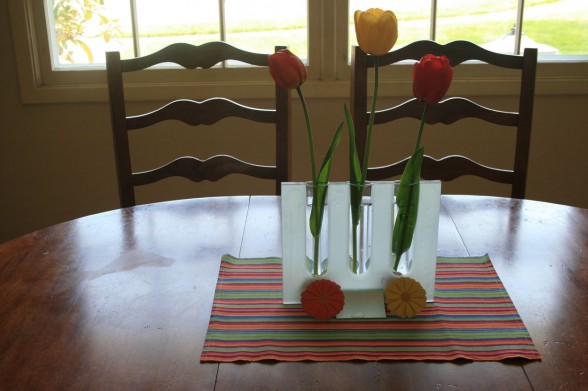 “Wherever you are, be all there. It is only possible in the posture of eucharisteo (thanksgiving). Give thanks and see God. Full attention slows the current. Simplicity is a matter of focus. That keeps the focus simple.” – Ann Voskamp, One Thousand Gifts
“Wherever you are, be all there. It is only possible in the posture of eucharisteo (thanksgiving). Give thanks and see God. Full attention slows the current. Simplicity is a matter of focus. That keeps the focus simple.” – Ann Voskamp, One Thousand Gifts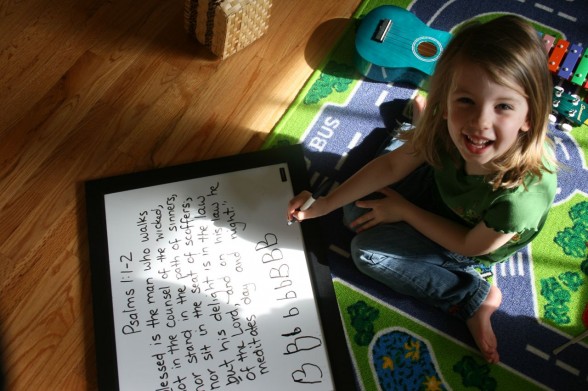 “The joy of God is the human being fully alive. And the life of the human consists in beholding God.” - Arasmus
“The joy of God is the human being fully alive. And the life of the human consists in beholding God.” - Arasmus “It is up to each of us to set the example, to show by our actions our respect for intimacy, contemplation, and wonder. This is perhaps the greatest legacy we can bestow on our children: the capacity to be enchanted by the quiet gifts of everyday life.” – Katrina Kennison, Mitten Strings for God
“It is up to each of us to set the example, to show by our actions our respect for intimacy, contemplation, and wonder. This is perhaps the greatest legacy we can bestow on our children: the capacity to be enchanted by the quiet gifts of everyday life.” – Katrina Kennison, Mitten Strings for God And thus my gift list continues….
And thus my gift list continues…. #360 – Titus singing so beautifully on pitch without words
#360 – Titus singing so beautifully on pitch without words #363 – Little musicians strumming and banging to make music
#363 – Little musicians strumming and banging to make music

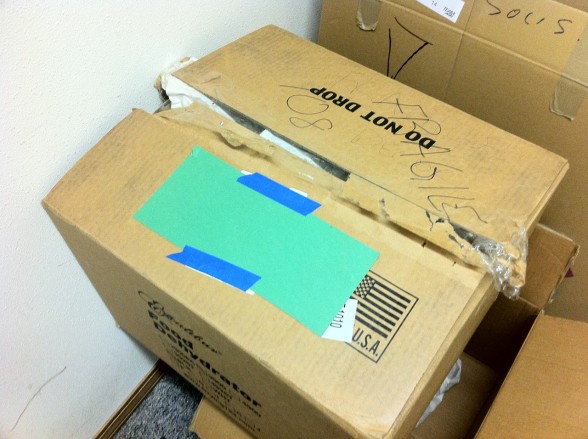
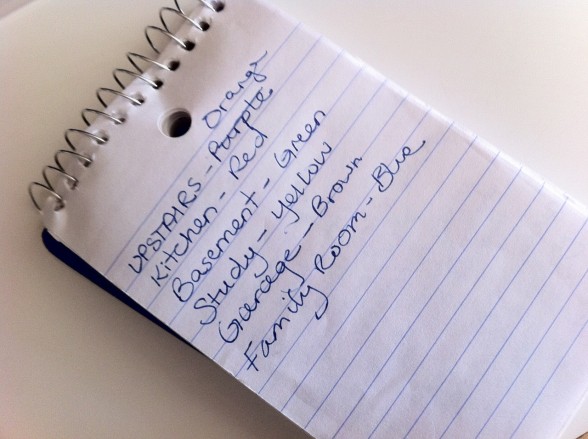 Start by picturing your new home and where you would like to relocate your goods. Sketch our a map if desired. Determine as you pack where they will be put in your new home. Chose a color for each new room in your home and then tape a construction piece of paper in that color on the box. When you move the boxes, then you can know easily where each box is going and then it is easy to unpack!
Start by picturing your new home and where you would like to relocate your goods. Sketch our a map if desired. Determine as you pack where they will be put in your new home. Chose a color for each new room in your home and then tape a construction piece of paper in that color on the box. When you move the boxes, then you can know easily where each box is going and then it is easy to unpack!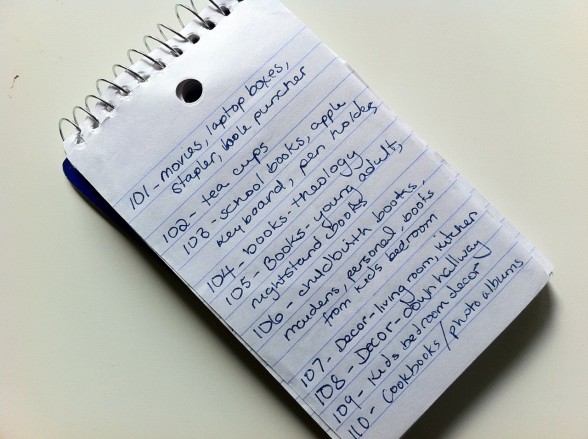 Rather than just randomly labeling each box with the contents, we chose to use the number system with a master itemized spreadsheet. I would number each box starting at 100 and make a quick list of the contents of each box on my spreadsheet. Each box would simply get the number written on several sides.
Rather than just randomly labeling each box with the contents, we chose to use the number system with a master itemized spreadsheet. I would number each box starting at 100 and make a quick list of the contents of each box on my spreadsheet. Each box would simply get the number written on several sides.